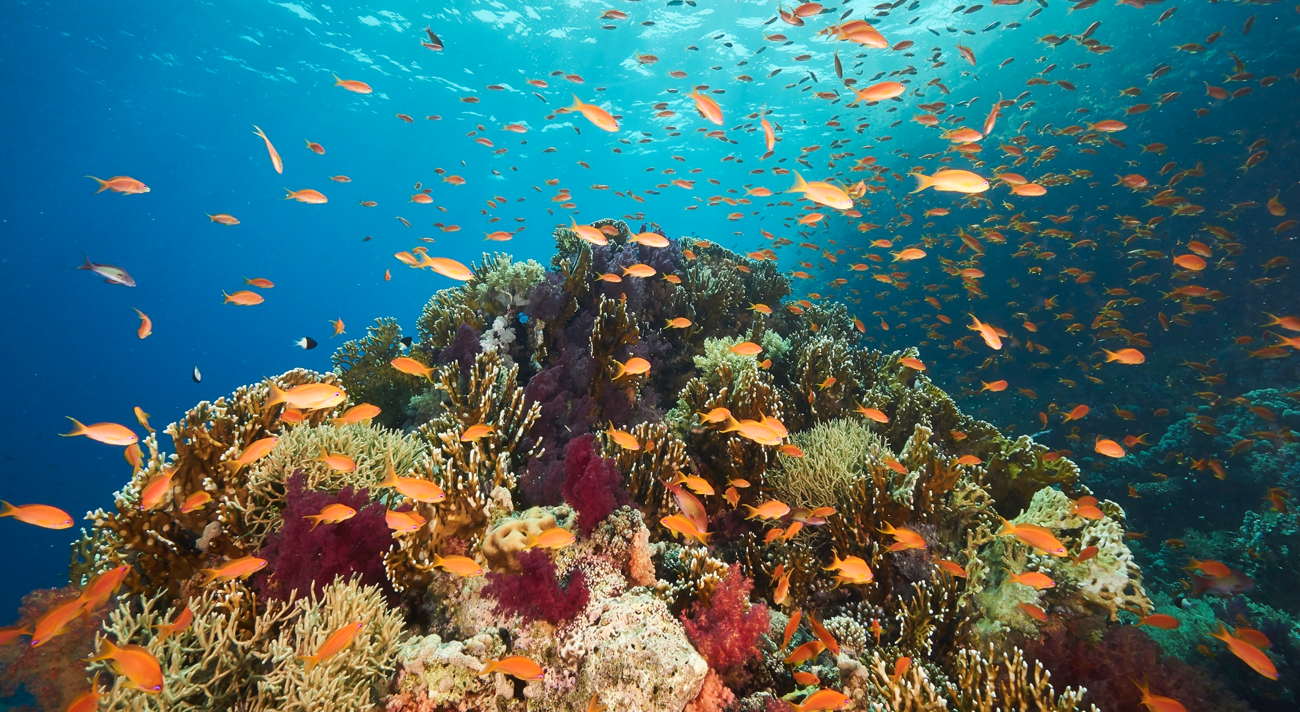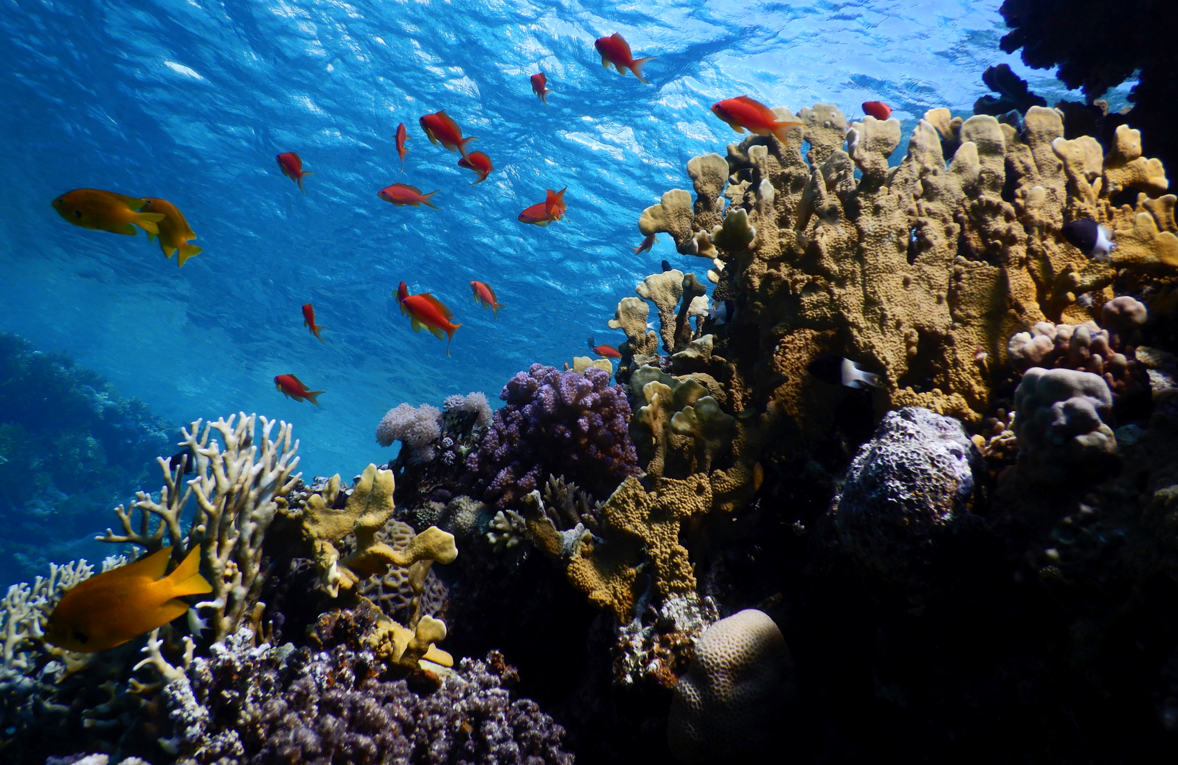
Red Sea coral spotlights Swiss ‘Science Diplomacy’

Coral from the Red Sea is special for its exceptional ability to withstand the effects of climate change, but the countries whose scientists can help protect it don’t always get along. Switzerland is working to bring them together through so-called “Science Diplomacy”, an area which the Alpine country is increasingly involved in.
“At the end of the century it’s projected that we will have lost 90 percent of our coral reefs because the temperature will get too warm,” says scientist Anders Meibom of the Federal Institute of Technology in Lausanne (EPFL), which is leading the coral research project. “But in the Red Sea we are quite sure that we have a population that can withstand these temperatures and still be fine, provided of course that the corals are not killed by local pollution in the region.”
Special coral from the Red Sea
Coral is our underwater forest, providing food and oxygen for the water and the ecosystem around the reef. Coral lives in symbiosis with algae, which feed it and give it colour. As the planet warms, the algae are leaving the coral, which loses its colour and starves to death.
Red Sea coral is more resistant to this process. As sea levels dropped in the last Ice Age, the Red Sea was cut off. Afterwards corals migrated back, but only those that could stand temperatures at its entrance of up to 36 degrees.
And so the idea was born to get all the countries around the Red Sea to work together in the Transnational Red Sea Research CenterExternal link to study and help protect the corals. This is critical, says Meibom, because the Red Sea is relatively small and any pollution by one country will affect them all. Yet these countries do not have easy relations with each other. They include Israel, Saudi Arabia, Sudan, Eritrea and Yemen, as well as Jordan, Egypt and Djibouti.
The aim is to bring scientists from those countries together, says Olivier Küttel, head of international affairs at EPFL. But it’s easier said than done.
“There’s no way we can do it just as scientists,” he says. “There are lots of political and diplomatic hurdles.”
Diplomatic support
That’s where the Swiss foreign ministry comes in.
“We are ready to offer diplomatic support and to facilitate the dialogue at the political level in order to create fertile ground for the project to materialise,” says Stefan Estermann, head of the sectoral foreign policies division at the ministry. But he reiterates that the project is mainly scientific, driven by EPFL researchers, and as such still needs to be finalised and funding secured.
Earlier this year, the foreign ministry organised an official launch for the project in Bern, bringing together politicians, scientists and diplomats. Ambassadors of the Red Sea countries were invited, and many of them came. Addressing the gathering, Foreign Minister Ignazio Cassis spokeExternal link of the “need [for] a stronger dialogue between science and politics” to meet the challenges of the future. This, he said, is why the foreign ministry is also supporting a new foundation called the Geneva Science and Diplomacy Anticipator (GSDA) – this time with money.
Cassis defined science diplomacy as “the use of scientific collaboration among nations to address common problems and to build constructive international partnerships”. He spoke of “more politics in science” but also “more science in politics” to make it more evidence-based. In a November 5 opinion piece for Le Temps newspaperExternal link also published by swissinfo.ch, Cassis stressed that science diplomacy was a key aspect of foreign policy strategyExternal link for the coming years, and that it now has a charter, namely the Madrid Declaration on Science DiplomacyExternal link.
CERN and barn owls
“There are several projects on our radar for their science diplomacy component, for example in areas like parasitology or ornithology,” says Estermann of the foreign ministry. “Researchers in these fields, especially those working in politically complex regions, have to overcome various obstacles to cooperate across borders, to work with their peers. So in a way they also become diplomats by necessity, and they contribute to dialogue and understanding in difficult contexts.”
Swiss projects combining science and diplomacy are not new, although more are developing due to the rapid advancement of technology.
“A very prominent example of Science Diplomacy is CERNExternal link, which was built on the ashes of World War II and brings together scientists from all over the world,” says Estermann. He points out that the physics research hub and particle collider near Geneva is reproducing its model elsewhere, having recently founded a project called SESAMEExternal link (“Synchrotron-light for Experimental Science and Applications in the Middle East”). And there are ideas for similar projects in other regions such as the Balkans.
A smaller-scale example is a “barn owls for peace” project led by Swiss ornithologist Alexandre Roulin which, like the Red Sea coral project, also has an environmental aspect.
Effectiveness
Switzerland’s neutrality and its reputation for scientific excellence make it a fertile ground for science diplomacy projects. But do they work?
Estermann uses the CERN example as a reference.
“CERN and Geneva became a melting pot where it didn’t matter where scientists came from; what mattered then and matters now is their contribution to science,” he says, pointing out that some 2,500 researchers from around the world now work at CERN.
“The peaceful scientific collaboration taking place in Geneva is an important message to the world and should be an inspiration for all of us.”

But Riccardo Bocco, a political sociology professor at the Graduate Institute in GenevaExternal link, recognises the potential pitfalls of science diplomacy. He says Switzerland needs to be careful it is even-handed in its treatment of the countries concerned and does not “legitimise” regimes like in Israel or Saudi Arabia. For example, he says some Swiss decision makers tend to show more sympathy for Israel because they see it as a kind of “Switzerland in the Middle East” that successfully prioritises high-tech research and development.
“They tend to look at that side of the reality and not the fact that Israel is not abiding by international law in Palestine, and they are fostering a relationship with a state, such as Saudi Arabia, which is not respectful of human rights,” says Bocco.
Back to the Red Sea
When it comes to the Red Sea project, Meibom thinks the two main challenges will be getting the governments to agree to work together and securing the necessary funding.
The project’s first priority will be taking samples of coral along the Red Sea to understand what state it’s in. That will take cooperation from multiple countries who don’t always get along.
“This is a very serious and complex piece of work,” says Meibom. “That’s why we need the diplomacy to work for us.”
Saudi Arabia recently declared that it wants its coral reef registered as a UNESCO World Heritage Site. If that happens, Meibom says the protected status given to the reef by the UN would open up potential for the political, diplomatic and scientific work that can be done in the region.
“From a scientific point of view, being able to work with the Saudis and their scientists on their reef along an almost 2,000 kilometre-stretch of the Red Sea, that’s just a dream!” says the EPFL researcher.
Science diplomacy from Geneva
The new “Geneva Science and Diplomacy Anticipator”External link might be able to help secure funding for the coral project, once it is up and running. It’s a foundation headed by former Nestlé CEO Peter Brabeck-Letmathe that will hold its first board meeting in December.
The Anticipator’s first challenge, says Brabeck-Letmathe, will be to identify emerging trends in science and technology and alert decisionmakers of their potential. Then, the Geneva-based foundation will “possibly finance large-scale exploratory projects with good governance” around those areas, such as artificial intelligence, gene editing, brain technologies or geo-engineering.
The foundation’s leader believes that if the Anticipator succeeds in its mission, “Swiss Diplomacy will have strengthened its good offices in a new field of competence”.

In compliance with the JTI standards
More: SWI swissinfo.ch certified by the Journalism Trust Initiative





























You can find an overview of ongoing debates with our journalists here . Please join us!
If you want to start a conversation about a topic raised in this article or want to report factual errors, email us at english@swissinfo.ch.